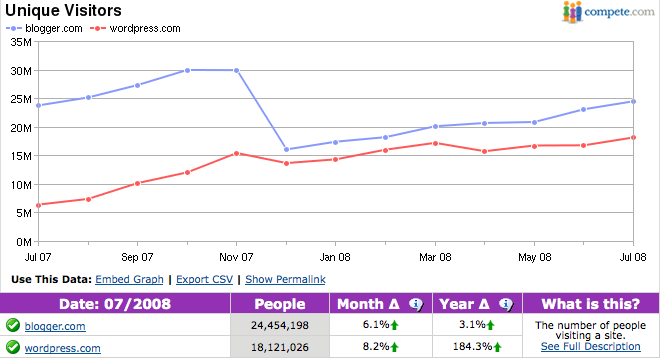A few years ago, in the early days of blogging, Google made a play to buy the Blogger platform. What occurred after that was a long period of time where Blogger received no love from their new parents. Also during this time, Movable Type came along and was then eclipsed by WordPress. WordPress went from a project to a business with the advent of Automattic and WordPress.com while the software remained an open source project for anyone to use and build upon.
It wasn’t until WordPress.com came along that we began to see some forward motion with Blogger. Google tied it to their authentication system and added some spit and polish, but nothing earth shattering. One of the biggest failures of Blogger is not the platform, but the management. It is the single largest source of splogs (or spam blogs) in the world – a failure of leadership that can be placed squarely at the feet of Google management. Meanwhile, WordPress.com is an open and airy environment that is policed actively (but passively, if that makes sense – no one is being a Nazi about content, but spam is ruthlessly dealt with).
While Google continues to release a parade of new products (anyone tracking the release of Google Shiny(Beta) today?), some of their largest and most potentially lucrative assets continues to meander aimlessly in an industry that continues to expand at a relentless pace.
Here’s a comparison between Blogger and WordPress.com
| Blogger | WordPress.com | |
| Cost | Free | Free* |
| Personal Domains | Yes | Yes* |
| Template Control | Yes | CSS* |
| Javascript | Yes | No |
| Discoverability | No | Yes |
| Remote APIs | Blogger | Movable Type, Metaweblog, Atom, WordPress |
| Portability | w/Domain Hosting only | WXR Export |
| * Optional Paid Upgrade | ||
Of all the migrations I’ve ever made, the biggest challenge exists around Blogger blogs. I’ve moved WordPress to WordPress, Movable Type to WordPress, Blogger to WordPress, Serendipty and Expression Engine to WordPress. I’ve moved TypePad to Movable Type. Blogger to Movable Type. You get the point. The most difficult migrations are off of the blogger platform.
Mark Evans suggested this morning that Google buy WordPress.com for name recognition and platform familiarity. The idea is to bolster the suite of services that Google offers now that it will have its integrated browser. Mark argues that WordPress.com has tons of traffic.
Here’s a hint though. Google doesn’t care about traffic. Plus, they have Blogger. Granted, Blogger sucks but according to Compete, it gets more traffic anyway.

So here’s what we know. Blogger gets more traffic, but savvy users like it less (particularly the UI and SEO). We also know that Blogger is a closed platform and that it is laden with spam. We know that Blogger is under very little active development, or their release schedule is abysmal.
We also know that WordPress is an open source platform that invites external developers to hack on it. We know there’s viable business in using the platform (hey, you don’t have to pay for active development on the platform!). We know that there is a hosted and self hosted version currently and that the WXR format makes it easy to transfer data around. We know that Akismet is open source and can be used to kill spam as well. We know that there are tens of thousands of people developing themes, plugins and offering knowledge. We know that it is possible to have a hosted version of WordPress in the vein of Blogger. We know Google engineers are smart.
So here’s what I propose instead. Leave Automattic alone. Let them keep innovating and building their enterprise client list like the New York Times, Dow Jones, and more. Matt has no interest in Google (at least he didn’t) as his philosophy is largely incongruous with Google (open source via mostly closed source).
Instead, Blogger should be transformed into an WordPress MU platform. Google engineers can solve problems such as providing FTP to other hosts, as Google has, with the new WP_Filesystem class that is used for plugin and automatic upgrades.
They can use their cloud to provide DNS services to point Blogger blogs to a different host, as they do now. They can tie in Google Auth with the available hooks. They can even port existing Blogger theme offerings to WordPress themes.
They retain the traffic and immediately compete on a close level, at least by all tangible metrics, with WordPress.com. Of course, there is that little thing about management styles where WordPress.com wins hands down in the current paradigm, but… thats something that can’t be addressed by technology.
Personally, I think it’s a solid play. May not happen, but it probably should for Google’s sake.
